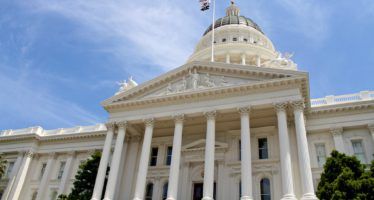Will Spending Cutters Rot in Hell?
By WAYNE LUSVARDI
In my hometown of Pasadena, and I suspect statewide, there is a concerted effort of local religious leaders to bombard local newspapers with letters advocating a state increase in taxes to save public schools.
What is being sought from religious leaders is to convince the public of the moral legitimacy for a tax increase. But is it ethical to ask misinformed religious leaders to advocate for a state tax increase for public schools that may be unneeded?
The nonpartisan Legislative Analyst’s Office’s (LAO) report of Feb. 2011, titled “Education Mandates: Overhauling a Broken System,” apparently didn’t think it was ethical to do so. The LAO wrote that “virtually every aspect of the K-14 (public school) mandate finance system is broken.”
The LAO report further stated that, if a mandated service does not serve a fundamental purpose, “the mandate should be eliminated.” The LAO’s package of recommended reforms would relieve schools districts and junior colleges of “hundreds of unnecessary activities that provide little value to students.”
It sounds more like the moral high ground might be to cut political job earmarks and pork-barrel programs rather than continue their funding in a time of widespread austerity and inflation in gasoline and food prices.
Ethical Precedent for Cuts
Apparently public school tax advocates are not apprising religious leaders that, along with federal stimulus funds, cutting the fat out of the state education budget is what saved the California public school system in 2010.
Back in 2009, the Legislative Analyst recommended that the Legislature deregulate funding mandates for “categorical” jobs and programs. “Categorical” is a bureaucratic term meaning a political earmark for a politically protected job or program not related to core teaching or essential school administration.
In response, the legislature responded and passed Assembly Bill ABX4-2, which reduced mandatory expenditures (or “political earmarks”) by $4.5 billion, thus saving K-12 public schools for the 2010 fiscal year.
The LAO report recommended another round of deregulation of mandated “categorical” jobs and programs for 2012 that would save $7.4 billion.
Included in this recommendation was a modest increase in average class sizes from 21 to 24 students statewide. The many anecdotal reports of increasing the average class size by up to double are at best hysterical and at worst intentionally dishonest and misleading. This doesn’t sound like a way to capture the moral high ground for a tax increase for public schools.
Single Ledger Accounting is Unethical
Here’s what’s unethical about the way public education bureaucracies go about issuing press releases and statements to the public about the situation of public school funding: They only talk about the half-truth of the forecasted loss of tax revenues for schools, not the reduction in expenditures on the other side of the ledger.
It is unethical for the press or public school bureaucrats to issue reports of dire school budgetary situations by only informing the public about the revenue side and not the expenditure side of the budget numbers as well.
For example, the $4.5 billion cut in school funding mandates in 2010 cited above would equate to a $726 per student state tax increase. If the LAO’s recommendation of $7.4 billion in addition cuts of funding mandates was enacted by the legislature for 2012, this would be the equivalent to an additional tax increase of $1,195 per student.
Gov Jerry Brown just reported that he is increasing school funding for the 2012 school year by $3 billion due to unexpected increased tax revenues. This would equate to $484 per student more for the coming school year than was budgeted.
On a net basis, school funding for core education activities could have potentially been increased by $7.4 billion, or $1,195 per student, since 2010 when revenue increases and actual and potential expenditure reductions are both factored into the equation. This is because tax cuts have mainly been to ancillary jobs and programs (“earmarks”) and not to core educational activities.
Potential Net Gain to Core Education Budget – 2010 to 2012
| Year | Status | Amount | Per Student |
| 2010 | Actual cuts to earmarks – ABX-4-2 | $4.5 billion | $426 |
| 2012 | Proposed cuts to earmarks – ABX-4-2 | $7.4 billion | $1,195 |
| 2012 | Proposed revenue increase by Governor | $3 billion | $484 |
| Subtotal Gain To Core Education Budget | $14.9 billion | $2,405 | |
| Prop 98 School Cuts 2010-12 | $7.5 billion | $1,211 | |
| Potential Net Gain/Loss to Core Education Activities | +$7.4 billion | $1,195 |
.
Governor Jerry Brown’s proposed 2012 General Fund Budget document reports that, from 2008 to 2012, Proposition 98 guaranteed funding for K-12 public schools was cut from $56.6 to $49.1 billion. That’s a $7.5 billion total cut.
But if Gov. Brown increases school funding $3 billion for 2012, the $7.5 billion loss in school funding from 2010 to 2012 would be entirely offset. That $3 billion from Gov. Brown would be added to the $4.5 billion of ABX-4-2. Total: 7.5 billion.
If another round of cutting public-school earmarks were enacted by the Legislature, funding for core education activities could potentially increase by $7.4 billion, or $1,195 per student. The situation at hand indicates that budget cuts to earmarks, coupled with the governor’s $3 billion proposed revenue increase, could result in more revenues for core educational activities without needing to raise taxes. Thus, the ethical situation at hand calls for budget cuts, not tax increases.
But that is not what you are hearing from state and local school officials. And unfortunately, misinformed religious leaders are apparently being conned into believing untruths. A budget crisis apparently is a horrible thing to waste.
Bureau-speak is Unethical by Definition
The newspaper media and religious leaders should be wise enough to expect that bureaucracies are always going to be issuing self-serving statements. Government bureaucracies don’t necessarily lie as much as they filter out half of the information that does not meet their self-interest. That is how bureaucracies by definition behave. They behave to protect their bureaucratic turf and political patronage. If they didn’t behave that way they wouldn’t be a bureaucracy.
But apparently the press and religious leaders take the pronouncements of public school bureaucrats at face value and uncritically, which is ethically dubious. If members of the press is not going to look critically at what government bureaucracies report, they have no ethical standard for the public to have faith in. And if religious leaders are going to allow themselves to be duped and used to make pleas for unneeded tax increases, the public should consider them to be “false prophets.” Religious leaders cannot merely claim ignorance. Ignorance is neither bliss nor ethical.
“Were you honest about taxes?”
The Wikipedia entry for “Jewish Ethics” states:
The Talmud denounces as fraud every mode of taking advantage of a man’s ignorance, whether he be Jew or Gentile; every fraudulent dealing, every gain obtained by betting or gambling or by raising the price of breadstuffs through speculation, is theft (B. B. 90b; Sanh. 25b). The Talmud denounces advantages derived from loans of money or of victuals as usury; every breach of promise in commerce is a sin provoking God’s punishment; every act of carelessness, which exposes men or things to danger and damage is a culpable transgression. There is a widely quoted tradition (Talmud Shabbat 31a) that in one’s judgment in the next world, the first question asked is: “were you honest in business?”
To which we might add the question: “Were you honest about government taxation?”
The teachers unions, public school boards and support organizations, the League of Women Voters and most newspaper editorials are perpetuating a fraud when they advocate an increase in unneeded taxes mainly for public school earmarks at a time when people are trying to make house payments using unemployment checks.
Even a prominent City Councilperson in the Pasadena area where this writer lives is pending foreclosure on the loan on his home. It is unethical to confiscate money from people suffering during the economic recession to pay for political earmarks. But this hasn’t deterred the local school district from hysterically advocating for a state tax increase to save public schools and proposing to put a future school parcel tax on the ballot.
To propose an unneeded state tax increase or a local school parcel tax for politically mandated public school earmarks, which even the State Legislative Analyst says is a “broken” system, is a fraud and as such is unethical.
There is no moral high ground for school tax increases or local parcel taxes at this time and religious leaders should beware not to be duped into endorsing such. Be as ethical as a rabbi, but as wise as a serpent, might be good advice.
Related Articles
Prop. 13 Split Roll Would Be Ripoff
JUNE 20, 2011 By WAYNE LUSVARDI and CHARLES B. WARREN Democrats in the California Legislature want to repeal the property
End of session defined by higher taxes, anti-Trump and union priorities
SACRAMENTO – California’s legislative session, which completed its work in the wee hours Saturday morning, was one of the more
Stockton SWAT Raid Over Student Loans
JUNE 10, 2011 By JOHN SEILER Editor’s note: This article was rewritten to reflect more recent information, which corrected some




